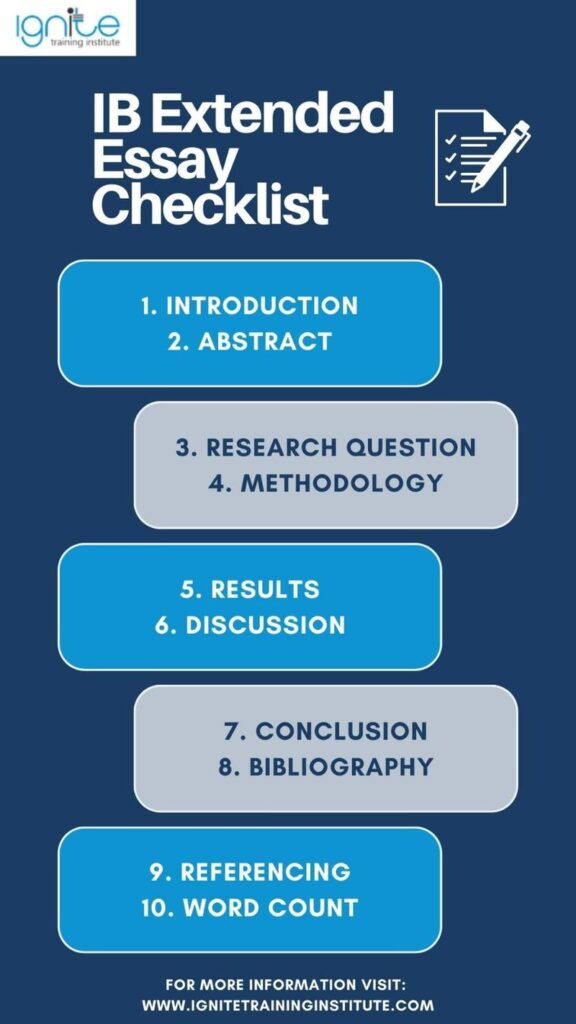The International Baccalaureate (IB) Extended Essay is a challenging and rigorous component of the IB Diploma Programme. It requires students to choose a research question, conduct extensive independent research, and present their findings in a formal essay format. The extended essay provides students with an opportunity to develop their research, writing, and critical thinking skills, and to delve into a subject that interests them in depth.
This essay is a significant component of the IB Diploma, as it contributes up to 36 points toward a student’s final score, and is considered an important factor in university admissions. In this blog, we will explore the importance of the extended essay and provide tips and guidance on how to succeed in writing a high-quality essay.
Furthermore, as Ignite Training Institute offers full-scale support for IB Diploma, know more!
Table of Contents
What Is An Extended Essay For IB?
The Extended Essay (EE) is a core component of the International Baccalaureate (IB) Diploma Programme (DP). It is a research-based essay of up to 4,000 words written on a topic of the student’s choice, under the guidance of a supervisor. The Extended Essay is a unique opportunity for students to engage in independent research and develop their skills in critical thinking, research, and writing.
The IB Extended Essay is intended to encourage students to explore their interests, develop their knowledge of a subject in depth, and demonstrate their ability to communicate their ideas effectively in written form. The Extended Essay is scored by external examiners and contributes up to three points toward the final IB DP score. The Extended Essay is a challenging but rewarding part of the IB DP and provides students with a valuable experience for their future academic and professional careers.
Related: The IB CAS Program: A Unique Approach to Learning
IB Extended Essay Checklist: What To Include?
The IB Extended Essay Checklist is a set of guidelines that students should follow when writing their Extended Essays. It is a comprehensive list of the essential elements that should be included in the essay to ensure that it meets the criteria set by the International Baccalaureate Organization (IBO). Here are some of the key components that should be included in an IB Extended Essay:

- Introduction: This should include a brief overview of the research question, the scope of the essay, and the methodology used.
- Abstract: A concise summary of the main findings, conclusions, and recommendations of the essay.
- Research Question: The research question should be clear, specific, and focused, and it should reflect the scope of the essay.
- Methodology: A clear and detailed description of the methods used to gather and analyze data.
- Results: This section should present the findings of the research, and it should be supported by data and evidence.
- Discussion: A critical analysis of the results and an interpretation of their significance.
- Conclusion: A summary of the main findings and conclusions of the essay, along with any recommendations for further research.
- Bibliography: A list of all the sources used in the essay, including books, articles, and other materials.
- Referencing: The essay should be properly referenced, using the appropriate referencing style, such as MLA or APA.
- Word count: The essay should be within the word limit set by the IBO, typically 4000 words.
10 Tips To Write An Excellent IB Extended Essay
The International Baccalaureate (IB) Extended Essay is a research paper that students write as a requirement for their IB Diploma. To write an excellent IB Extended Essay, you should follow these steps:
- Choose A Topic: Choose a topic that you are passionate about and have enough information to research.
- Conduct Research: Gather information from multiple sources and note important information.
- Create A Research Question: Formulate a research question that will guide your investigation and analysis.
- Plan Your Essay: Organize your information and ideas into a clear and logical structure.
- Write The Introduction: Introduce your topic, research question, and thesis statement.
- Develop The Main Body: Present your research, arguments, and evidence in support of your thesis.
- Write The Conclusion: Summarize your findings, explain their significance, and restate your thesis.
- Use Credible Sources: Cite all sources of information used in the essay to avoid plagiarism.
- Revise & Edit: Check for grammar, spelling, and punctuation errors and make revisions as needed.
- Get Feedback: Seek feedback from your teacher or peer to identify any weaknesses in your essay and make improvements.
What Is The Assessment Criteria Of An IB Extended Essay
The grading system of the International Baccalaureate (IB) Extended Essay is based on a scale of 0 to 36 points. The essay is evaluated using four assessment criteria, each worth a maximum of 7 points. The criteria are:
Criterion A: Research Question
Criterion B: Introduction
Criterion C: Investigation
Criterion D: Conclusion
Each criterion is marked by two independent assessors, who award marks based on the quality of the student’s work in that area. The final grade is the average of the two assessors’ marks, rounded to the nearest whole number. The extended essay contributes up to 3 points towards a student’s overall score in the IB Diploma Program, with the maximum score of 36 points equating to a grade of A.
The assessment criteria are designed to measure the depth and quality of the student’s research and writing skills, as well as their ability to analyze, interpret, and evaluate sources. Additionally, the criteria assess the student’s ability to use critical thinking and independent judgment to address the research question and support their argument with evidence.
Is Extended Essay Important For IB Diploma?
The International Baccalaureate (IB) Extended Essay is an integral part of the IB Diploma Programme. Here’s why it is important for the IB Diploma Programme.
- A Significant Part Of The IB Diploma: The Extended Essay (EE) is an important component of the International Baccalaureate (IB) Diploma Programme, accounting for up to 3 points out of the total of 45 points.
- Develops Research & Writing Skills: Writing an Extended Essay requires students to engage in independent research and develop their critical thinking and writing skills.
- Enhances Subject Knowledge: By choosing a topic that interests them and conducting in-depth research, students can develop a deeper understanding of a specific subject area.
- Prepares For University Studies: The Extended Essay provides students with a taste of what academic research and writing are like at the university level, preparing them for future academic challenges.
- Improves Time Management & Organizational Skills: Completing the Extended Essay requires students to manage their time effectively, prioritize tasks and stay organized, skills that are essential for success in higher education and beyond.
- Boosts Confidence & Self-Esteem: The successful completion of the Extended Essay can be a source of great pride and self-esteem for students and can help build their confidence in their own abilities.
- Improves Language Skills: Writing the Extended Essay in English, and presenting it in a clear and concise manner, helps students to improve their language skills.
- A Valuable Addition To College Applications: Completing an Extended Essay demonstrates to colleges and universities that students are capable of independent research and writing, making them stand out as strong candidates for admission.
#1 Support For IB Diploma In UAE
Ignite Training Institute is a well-known and highly respected institution that provides comprehensive support to students enrolled in the International Baccalaureate (IB) Diploma Programme. Whether you are looking to improve your grades or get a head start in your future academic career, Ignite Training Institute has you covered.
At Ignite Training Institute, you can expect to receive a first-class education experience. Our experienced and knowledgeable instructors understand the unique challenges that students face when pursuing the IB Diploma Programme, and they work tirelessly to provide you with the support you need to succeed. With a comprehensive curriculum that covers all of the key subjects and topics in the IB program, our courses are designed to help you reach your full potential and develop the skills you need to succeed in your future academic and professional careers.
Related: How To Find The Best Coaching Institute In Dubai?
FAQs
1. Is IB Extended Essay Hard?
The difficulty level of the IB Extended Essay (EE) varies from student to student. Some students may find the process of research and writing the essay challenging, while others may find it relatively easier. The difficulty of the EE depends on factors such as the student’s writing skills, time management abilities, research skills, and understanding of the topic chosen.
2. What Makes A Good IB Extended Essay?
A good IB Extended Essay is one that showcases the student’s ability to conduct independent research and present their findings in a well-structured, organized, and analytical manner. It should demonstrate the student’s understanding of the research topic and their ability to critically evaluate and analyze information. The essay should also reflect the student’s originality and creativity, and showcase their writing skills.
3. How Important Is The Extended Essay In IB?
The EE is assessed and contributes to a student’s overall score for the IB Diploma. As such, it is important for students to take the EE seriously and put in the necessary time and effort to produce a high-quality piece of work. This not only demonstrates their competence in research and writing but also showcases their intellectual curiosity and ability to engage with complex topics.
Conclusion

The IB extended essay is a crucial component of the International Baccalaureate Diploma Programme. It provides students with the opportunity to engage in independent research and develop important skills such as critical thinking, time management, and effective communication. The extended essay also offers students the chance to explore a topic that they are truly passionate about and demonstrate their ability to think critically and creatively.
Ultimately, the extended essay is a valuable experience that prepares students for the challenges and opportunities of higher education and beyond. By embracing the extended essay process, students can gain a deeper understanding of their chosen topic, enhance their research and writing skills, and achieve greater academic success. As Ignite Training Institute offers full academic support for IBDP, get in touch with expert consultants today.
Related: List Of Top 10 Benefits Of The IB Diploma Programme





